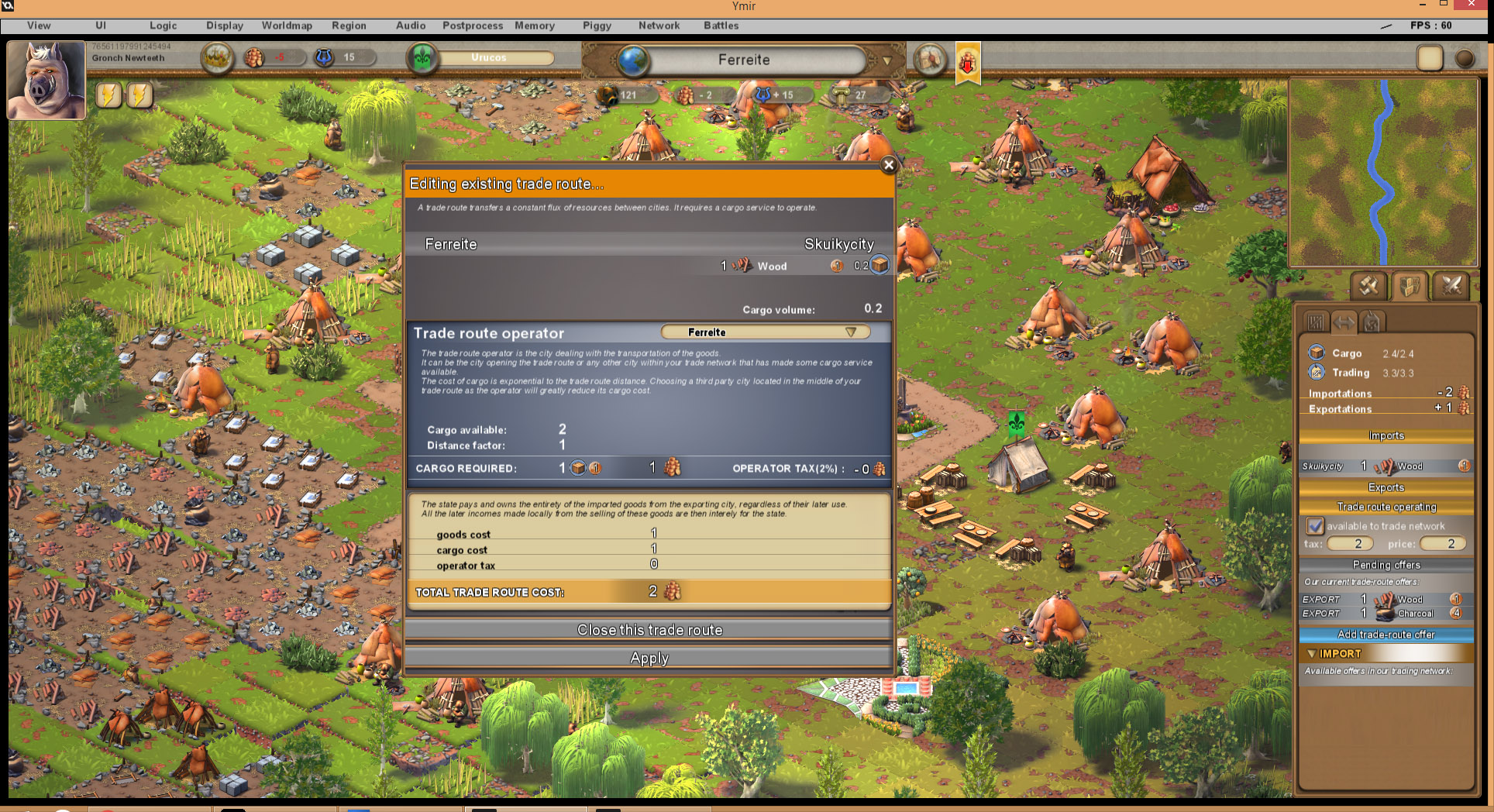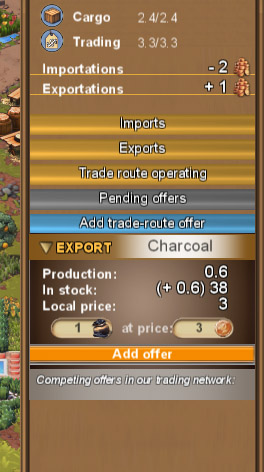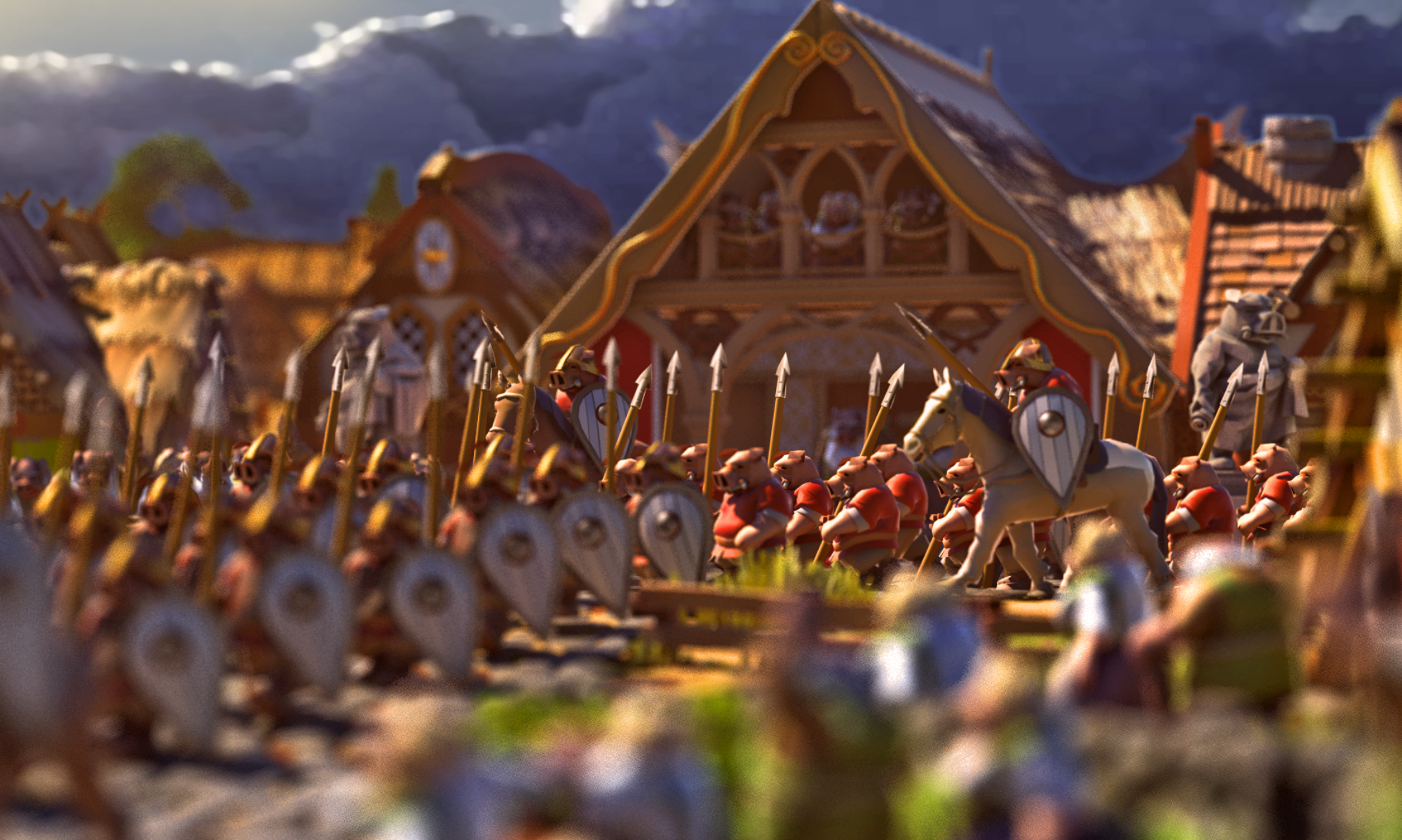The trading system is now implemented, completing the 3rd task of the 5 remaining! I am now moving to the 4th one : technologies.
There is 4 different types of commercial activities in Ymir.
The first one is the most primitive and basic one : manually loading resources into a group carrier units, travelling to destination and unloading the goods from their inventory.
The second one is the most common one among games of this genre : trading offers to sell and buy amounts of resources at specific prices. You can put any material resource for sale and it will be available for sale to anyone in your trading network.
The third one is more advanced: Trade Routes. They allow for the constant transfer of a resource instead of a one-time sale. For instance, with a trade route, you can arrange to constantly transfer a certain amount of food produced in a farming region to your capital.
The fourth one is related to trade routes as well: to work, a trade route needs a service called Cargo. Cargo represents the fact ships and caravans are required to constantly carry the goods along a trade route.
CARGO
You can produce this service by building docks in your city. This special service can be ‘rented’ from any of the cities of your trading network, and when you open a trade route, you have to choose an “operator” : the city that will provide the required cargo service for this trade route and deal with the transportation of goods. You can choose your own city for this, but also any city of your trading network that has enough cargo available. The cargo required for a trade route depends on the volume of resources traded, but its also affected exponentially by the total distance of the trade route.
Now this is where it gets interesting : the distance is calculated from the operator’s location. This means that choosing an operator in the middle of your trade route will make it A LOT cheaper than choosing to operate the route yourself from one end of the route, where the distance factor is maximal.
This also means that strategically placed cities can thrive simply by ‘operating’ trade routes, without producing anything themselves, but simply by providing cargo to others and effectively becoming a “trading node”. Cargo generates incomes for your traders, which in turn generates tax revenues for the city. But on top of that, cities can raise a customs tariff, taxing a percentage of the value of all goods of every trade route operated by the city, generating additional income.
TRADE ROUTE COSTS
When you sell goods via trade route or regular sales, the generated income doesn’t belong to you ( the state ) but to the owners of the sold resources ( local producers in your city ).
When you buy goods however, it is you (the state) that buys them at the price specified in the offer. The imported goods therefore belong to you, and not to local producers in your city.
Later on, If these goods generate incomes ( by beeing sold to local population via merchants or consumed by industries ect .. ) , the generated incomes will this time go directly to the state, potentially reimbursing you the cost of importation. For instance, if you import tomatoes at a price of 2 but that they are worth 3 on the local market of your city, you could very well generate profits for yourself.
However , trade routes are expensive as not only do you have to pay upfront for the imported goods but you also need to pay for the cargo service, and to eventually pay a customs tariff.

TRADING NETWORK
You can only trade with your own cities , or cities belonging to a state that has given you access to its trade ( via a diplomatic treaty ). You will only be able to sell and see the trade offers from cities of your trading network.



Just registered to show my support! This looks absolutely amazing, which i’m sure you’ve heard from many others.
What’ll be the price for it on launch?
No nothing of that for now, unfortunately.
When i implement a proper siege mechanic one day, raiding and blocking trade routes is definitely a thing i have planned though!
OMG :O
This update is awsome!!!!! Finally a game that takes not only the site, but the placement of a city in consideration. As a urban geographer, I’m very happy to see this! I always wanted a game to have this feature, as it’s vital to understand the actual positioning of ancient/modern cities =)))
I’ve got a couple of questions, though. It’ll be possible to raid trade routes? We can siege some towns/cities (thinking about the “supplyes route”)? The tiles in the map could have different “cargo” costs: rivers, plains etc.. are more cheaper and easy to transport goods then forests, or mountains. With that in mind, I’ll ask if we could build roads to improve the trade cargo, or, at least, reduce the trade costs….
The hype is everyday grater :DDDD
Thank you Ronchon!
Just amazing I can’t wait! More then one city will be awesome to have! How many armies can you have?
Yes you can have multiple cities at the same time!
I haven’t read all your post but can you have more then one city in a game? Say you have a start village and then take over another place, lets say right next to you, can you go into that place and build another city just like the first place you started in? and great work! I am waiting very oh so patiently for this amazing game!
Yes you can choose to make cargo available to others or not.
There is no “money” at the beginning of the game, as you are a primitive tribe where all members share things in a “gift economy” system.
Later, yes, you gain money by taxes.
And yes to transfer resources between your own cities, you’ll have to buy resources from the local producers unless you decide to seize them which allows the state to take things and consume things for free. But then it means no revenues for the producers of these resources…
Can’t edit my last message, but looking at the last dev diary, it seems taxes collectors aren’t necessary to collect taxes. So we probably can do it from the start. One question answered, I think. ^^
The cargo system seems cool and I like the idea of a (maybe) neutral merchant-city which comes naturally with your system.
Can a player reserve some cargo-spot for himself, or everybody in his network can use his cargos without limitations ?
Others questions. As far as I remember, the state can gain money by trading (but only by buying aboard and selling on the local market) and by taxes, is that only it or is there other ways ? What is the fastest way to gain some money ? I remember some building costed maintenance, but can we gain money from taxes at gamestart ?
What would happens if I wanted to transfer resources from two of my cities ? Would I have to buy it from local producers and put it on the local market ?
I don’t like to repeat myself much, but I’ll say it once again, it’s nice to see the game progressing. You’re almost there !